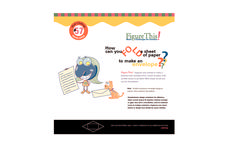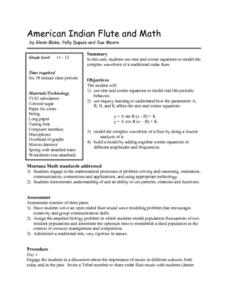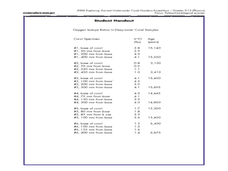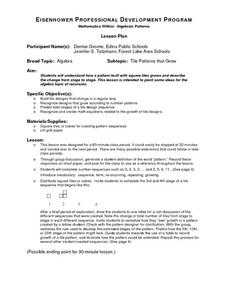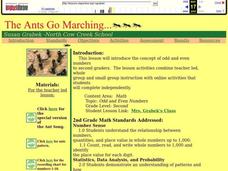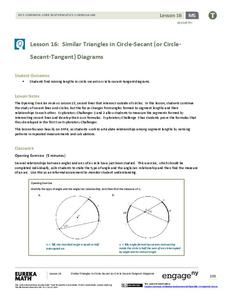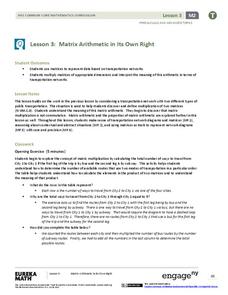Curated OER
Math Challenges
Students participate in a series of challenging math lessons designed to engage their critical thinking skills. In these real-world problem solving lessons, student solve symmetry and repeated pattern problems, make lists/tables to...
Curated OER
Recognize, create and Record Simple Repeating Patterns
Students analyze, create, and record repeating patterns. In this geometry lesson, students create shapes using patterns and keep track of the different shapes. They incorporate transformation and reflections into their patterns.
Curated OER
Math Regents Exam Questions: Lesson 1-6 - Mean, Median, Mode and Range
In this mean and median worksheet, students examine given data and determine the measures of central tendency for the data. Students compute the mode, mean, median, and range of data. They create stem-and-leaf plots. This ten-page...
Curated OER
Applied Science - Science and Math Lab
Students examine fabric. In this Applied Science lesson plan, students look at the fibers of fabric through a microscope. Students compare and contrast a variety of fibers.
Curated OER
American Indian Flute and Math
Students investigate the Math behind Musical instruments in this cross-curricular Math lesson on the Native American Flute and waveforms. The lesson can be accomplished in 6 days and includes an extensive materials list for successful...
Curated OER
How can deep-water corals be used to determine long-term patterns of climate change?
Students explore the concept of paleoclimatological proxies. In this paleoclimatological proxies lesson plan, students explain isotope ratios in deep water coral samples. Students write a paragraph about global climate change as it...
Curated OER
Hundred Chart
In this math worksheet, learners examine a hundred chart. The ten by ten chart includes all numbers one to one-hundred. Students may identify patterns in the chart.
Curated OER
Applied Science - Science and Math Post-Lab
Students explore optical illusions. In this Applied Science lesson, students view optical illusions and record the data of what they see. Students graph the data that they collect.
Curated OER
In and Out Function
Third graders examine how to solve in and out function problems, or mystery numbers. They analyze a variety of mystery number problems together and extend the patterns. Students then independently complete a Mystery Number activity...
Curated OER
Tile Patterns that Grow
Students explore how a pattern built with square tiles grows and describe the change from stage to stage. They predict later stages of a tile design sequence and create math equations related to the growth of tile designs.
Curated OER
Linear Patterns in Data
Eighth graders extend their learning of graphing linear equations and are introduced to connecting patterns in tables and graphs to represent algebraic representations. They then determine patterns and extrapolate information from these...
Curated OER
Find a Pattern
In this patterns worksheet, 2nd graders find the pattern in 1 word problem and then solve it. Students answer 1 short answer math problem directly related to the first word problem.
Curated OER
How Many Ways Can You Represent a Number?
Students participate in monthly scaffolded lessons that focus on working with whole numbers from 1 to 10. They work with tiles on exploration mats, number tile mats, and a number representation book. Each month they complete activities...
Curated OER
Odd and Even
Explore the concept of odd and even with your class using this resource. Learners take an online test demonstrating their knowledge of odd and even, sing a song about the concept, and engage in computer-based activities.
Curated OER
Relations
Students identify, compare, and analyze shapes and numbers. In this analogies and comparison math lesson, students warm up by completing 4 worksheets to familiarize themselves with analogies. In small groups, students are challenged to...
Alabama Learning Exchange
Mix it Up! Exploring the Commutative and Associative Properties of Addition
Examine commutative and associative properties with your class. They'll explore the relationships between addition and subtraction and investigate patterns as they solve addition problems. Links to an assessment and a table game are...
Virginia Department of Education
Properties
Examine some properties that don't require a general contractor. Scholars first complete a mental math activity that uses the properties of real numbers. A separate activity formalizes these properties.
Alabama Learning Exchange
Bloodstain Pattern Doesn't Lie......
An interesting instructional activity on hypothesizing about the diameter of a drop of blood that is splattered. To test their theories, learners work in groups to make blood droplets splatter from different heights. They use graphed...
Curated OER
Math, Fractions, and Music
Students discover the relationship between musical rhythms and fractions. They add musical notes together to produce fractions and create addition and subtraction problems with musical notes. Students complete worksheets and create their...
EngageNY
Understanding Box Plots
Scholars apply the concepts of box plots and dot plots to summarize and describe data distributions. They use the data displays to compare sets of data and determine numerical summaries.
EngageNY
Similar Triangles in Circle-Secant (or Circle-Secant-Tangent) Diagrams
First angle measures, now segment lengths. High schoolers first measure segments formed by secants that intersect interior to a circle, secants that intersect exterior to a circle, and a secant and a tangent that intersect exterior to a...
EngageNY
Matrix Arithmetic in Its Own Right
Matrix multiplication can seem random to pupils. Here's a instructional activity that uses a real-life example situation to reinforce the purpose of matrix multiplication. Learners discover how to multiply matrices and relate the process...
Noyce Foundation
Granny’s Balloon Trip
Take flight with a fun activity focused on graphing data on a coordinate plane. As learners study the data for Granny's hot-air balloon trip, including the time of day and the distance of the balloon from the ground, they practice...
CK-12 Foundation
Sum and Difference of Cubes: Stacking Blocks
Investigate polynomial factoring patterns by finding a connection to volume. As learners build a three-dimensional solid from smaller solids, they convert the visual model to a mathematical expression. Their models represent the sum of...


